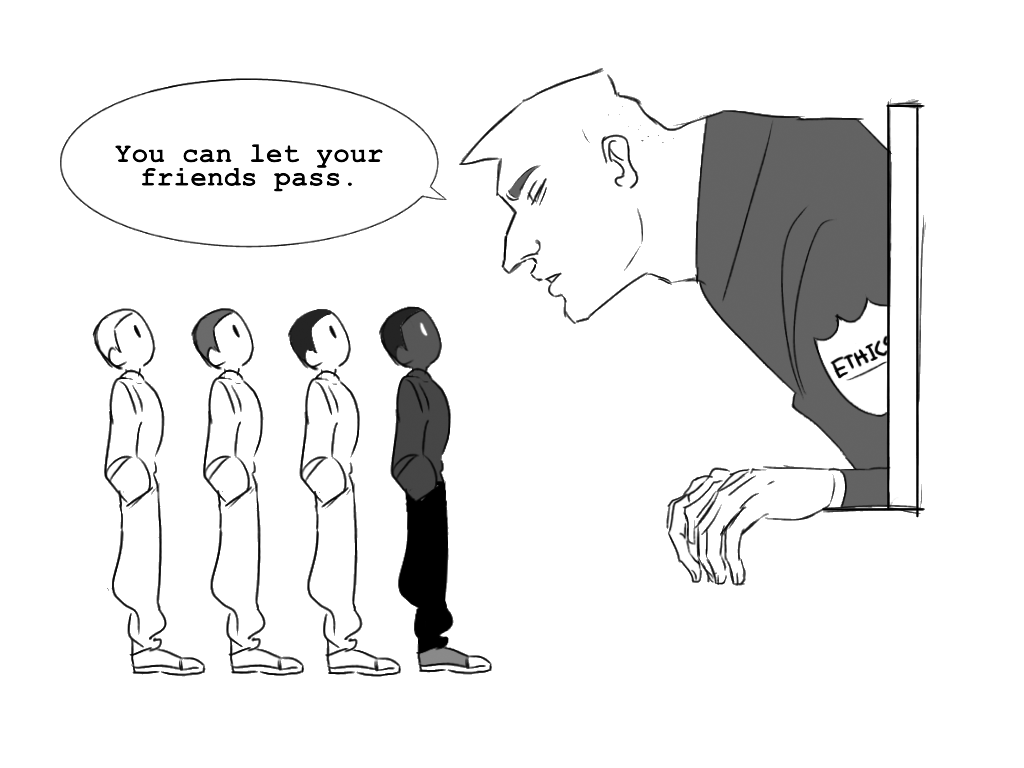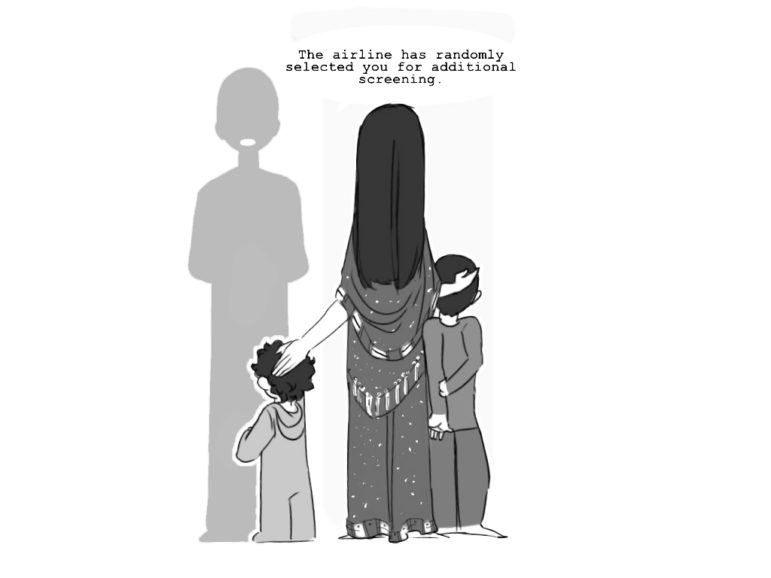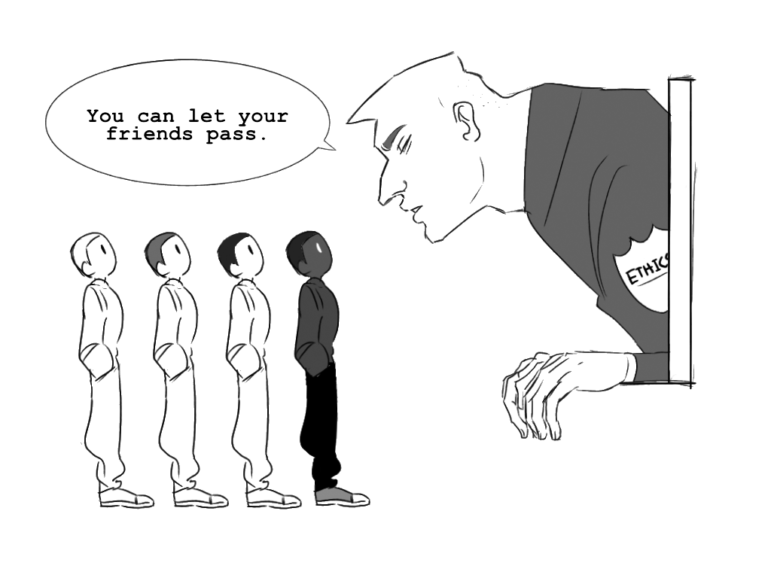
By Kasey Woo and Kimberly Woo
Skiing down the wintery, Tahoe slopes with icy snow crystallizing around the corners of his ski goggles embodied Asian senior Tyler Ong’s idea of a meaningful bonding moment with his uncle. Unfortunately, a Caucasian male pierced through the blooming relationship with a simple yet harmful sentence: “Make sure you open your eyes, chinks.”
As offensive as this situation is, it is not uncommon. Racial discrimination limits people to be judged by the color of their skin, which assigns an unfair prejudice on one race, disregarding an individual’s character. Senior Tara Arcia believes that racist beliefs derive from past unethical actions, saying, “Our country is built on the oppression of people that we consider to be inferior, like slavery. [The media is] perpetuating these stereotypes to say if you’re black, then you’re criminal. There’s no clear way to educate people about their identity and how to treat others who are different from you without hatred or pushing an entire group of people to a lower level.”

Senior Alex Garcia explores the bystander effect, where the inactivity of a bystander to stop an event only increases the probability that the event will occur again. He says, “There’s people at Aragon [who] are very [harsh] towards African-Americans and they drop the “n-word” a lot. Out of nowhere, they just see someone, and they just say all of this stuff. Sometimes, if you tell them to stop, it goes way worse for you, and they turn on you, and they start saying stuff to you. Then, in a sense, you can consider that bullying, but I think people are afraid to lose the friends or have their friends see them differently after they do that. You have friends you want to keep around and sometimes you feel that speaking out and doing the right thing will only bring more harm to you even though you are helping someone. You could consider that being selfish.”
Further misconceptions based on race persist in society, even revealing themselves in a person’s opportunities in life. Racial profiling has the potential to harm a person’s future and opportunities. To the eyes of an employer who is too blinded by their race to notice their personality and skill, their skin may become an obstacle to landing that job that will help support the financial needs of the family. Health and Wellness Counselor Jillian Ma explains how racial profiling can initiate the domino effect of an individual’s missed life opportunities, saying, “People might look for one certain race. They may be investigated in criminal investigations. That person may lose their job because of that, and then that person can’t afford their rent. They have to move into an area where there [are higher crime rates].”
Media platforms can further promote racial sterotypes through showcasing one specific ethnicity group over others. For example, Arcia describes the lack of racial representation in the television shows that she watched: “As a child, I don’t think, on American television, I’ve ever seen someone who looks like me, a brown Asian girl. I think that’s not right, especially knowing that the makeup of the U.S. is not all white or as white as media usually is.”
Racial discrimination in the modern age can occur in daily encounters. Senior Nicole Jimenez-Mota’s mom has experienced this type of scenario before. During a visit to the local county to file paperwork, Jimenez-Mota’s mom had to write down the names of her children. After submitting her application, the man behind the counter inspected the document and remarked, “That’s weird. People from your type of people usually all have different kinds of baby daddies.”
“As a child, I don’t think that, on American television, I’ve ever seen someone who looks like me, a brown Asian girl.”
Senior Ryan Vara explains his experience in which he believes he experienced profiling. Vara was walking home from school when a police officer abruptly stopped him in his path. After a few questions, the police officer left Vara alone and continued on his way. Puzzled by this initial encounter, Vara says, “[The police officer] really had no reason to stop me and I was wondering why he would have stopped me. It could have been [that I was] walking to the neighborhood alone in the middle of the day.” Despite this encounter, Vara still remains optimistic on his view of the police as he says, “It didn’t change my view on cops, and I still think cops are good at heart.”
Garcia, treasurer of Latino Club, aims to teach members of Latino Club to understand the reasoning behind prejudiced mindsets and how to address them. He explains, “Most of the people [in Latino Club] are of Latin descent, and a lot of them have experienced racial profiling. We try to let them know that some people are born like that. It’s always important for us to understand that it’s getting better and that we can’t really blame others because they were raised that way. In a sense, I’d like for the members of Latino Club to understand that’s who they are and that’s how they grew [up] to be.”

Junior Soleia Sano, president of Black Student Union and treasurer for Armenian Club, agrees with Garcia’s realization, continuing to spread awareness and pursuing solutions to mitigate the effects of this problem. She says, “We had this unit about the “n-word,” not just the one that they used within history about slaves [but also] the one that is used today in rap songs. We had a discussion [exploring] ‘is it right for people to define themselves that way, is it wrong for others to, [or] is it right to use the word at all?’ By stopping people [from] using this word, it gives insight on how it has affected us through history, and it’s more on educating others on not what we believe is right but what is right in the community.”
With media influence and cases of police brutality, police officers have been depicted with associations to racial profiling. Although there are some racist police officers in the United States, School Resource Officer Steve Bennett claims that these misconceptions do not truly reflect the socio-economic living conditions. He says, “It’s a cheap shot at the police to say, ‘You guys always arrest only African-American people’ or ‘You only arrest Hispanic people,’ when, in fact, society is still responsible for segregating these neighborhoods. In [some] neighborhoods, poverty is higher and the crime rates are higher … [But] there [are some] police officers in this country who are racist.”
Although harsher forms of racial discrimination such as institutionalized segregation declined in history, racial discrimination still remains prevalent. Senior Alejandro Tenorio says, “From the Civil Rights Movement, we’ve made a lot of progress, but not a complete solution. When you see racism, more people are willing to stand up and speak up about it than they were in the past.”




